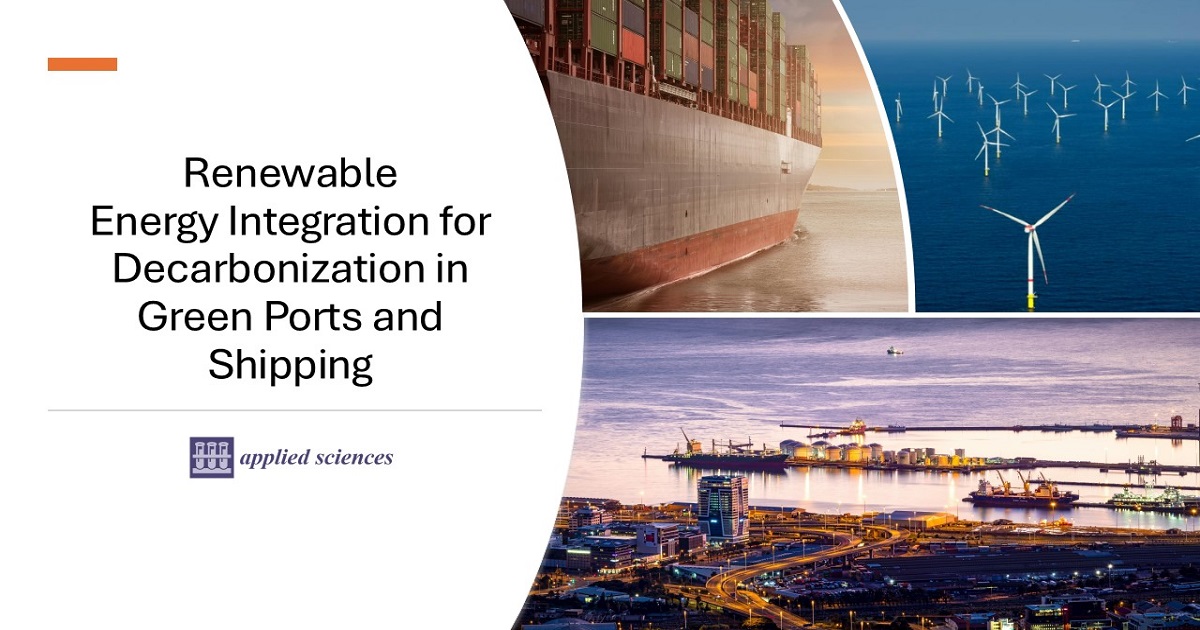Renewable Energy Integration for Decarbonization in Green Ports and Shipping
A special issue of Applied Sciences (ISSN 2076-3417). This special issue belongs to the section "Transportation and Future Mobility".
Deadline for manuscript submissions: 10 March 2026 | Viewed by 7074

Special Issue Editor
Special Issue Information
Dear Colleagues,
Decarbonization of the maritime transport sector is becoming increasingly critical as its environmental impact continues to grow. According to the International Maritime Organization (IMO), the share of shipping emissions in global anthropogenic emissions has increased from 2.76% in 2012 to 2.89% in 2018. In ports, the energy demand is significant, as berthed ships keep their auxiliary engines running to support hoteling services such as lighting, HVAC systems, fans, and pumps. This results in pollutant emissions that can easily drift into nearby cities. In addition, the evolution of ports, in terms of reinforced quays for larger ships, more complex logistics for goods transport, and new facilities to support offshore operations, can increase the environmental impact of the zone.
The integration of renewable energy is pivotal for reducing these emissions, both on ships and in ports, especially as ports are often located close to urban areas. To address these challenges, the adoption of renewable energy sources offers promising pathways for achieving energy efficiency and decarbonization.
This Special Issue focuses on the integration of renewable energy in ports and shipping, exploring innovative solutions that enhance sustainability. For example, renewable energy sources such as solar, wind, and hydrogen can transform ports into Renewable Energy Communities (RECs), enabling the sharing of energy between local energy producers and consumers. Hybrid systems, combining multiple renewable sources and energy storage systems, can also support energy self-sufficiency and enhance the efficiency of both ships and ports.
This Special Issue aims to collect contributions that showcase strategies, technologies, and case studies for renewable energy integration to support decarbonization efforts across the maritime sector.
Dr. Daniele Colarossi
Guest Editor
Manuscript Submission Information
Manuscripts should be submitted online at www.mdpi.com by registering and logging in to this website. Once you are registered, click here to go to the submission form. Manuscripts can be submitted until the deadline. All submissions that pass pre-check are peer-reviewed. Accepted papers will be published continuously in the journal (as soon as accepted) and will be listed together on the special issue website. Research articles, review articles as well as short communications are invited. For planned papers, a title and short abstract (about 250 words) can be sent to the Editorial Office for assessment.
Submitted manuscripts should not have been published previously, nor be under consideration for publication elsewhere (except conference proceedings papers). All manuscripts are thoroughly refereed through a single-blind peer-review process. A guide for authors and other relevant information for submission of manuscripts is available on the Instructions for Authors page. Applied Sciences is an international peer-reviewed open access semimonthly journal published by MDPI.
Please visit the Instructions for Authors page before submitting a manuscript. The Article Processing Charge (APC) for publication in this open access journal is 2400 CHF (Swiss Francs). Submitted papers should be well formatted and use good English. Authors may use MDPI's English editing service prior to publication or during author revisions.
Keywords
- decarbonization
- microgrid
- renewable energies
- renewable energy communities
- smart ports
- green ports
- cold ironing
- environmental impact
- air pollution
- shipping
- energy forecasting
- energy production
- energy storage
- energy demand
- energy management
- forecasting
- solar energy
- wind energy
- hydrogen
Benefits of Publishing in a Special Issue
- Ease of navigation: Grouping papers by topic helps scholars navigate broad scope journals more efficiently.
- Greater discoverability: Special Issues support the reach and impact of scientific research. Articles in Special Issues are more discoverable and cited more frequently.
- Expansion of research network: Special Issues facilitate connections among authors, fostering scientific collaborations.
- External promotion: Articles in Special Issues are often promoted through the journal's social media, increasing their visibility.
- Reprint: MDPI Books provides the opportunity to republish successful Special Issues in book format, both online and in print.
Further information on MDPI's Special Issue policies can be found here.





